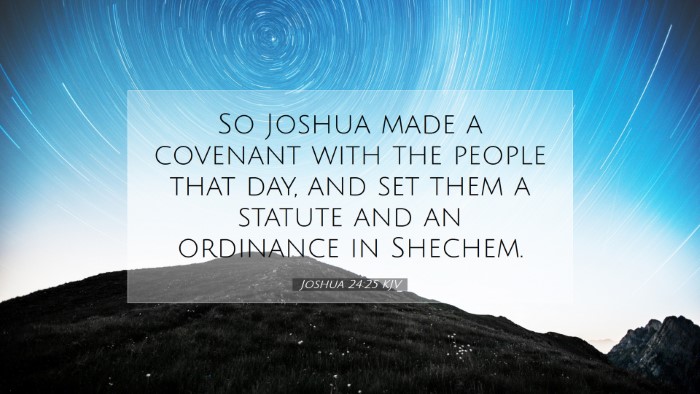Commentary on Joshua 24:25
Introduction:
Joshua 24:25 is a pivotal verse in the narrative of the Israelites' covenant with God, encapsulating themes of commitment, leadership, and divine faithfulness. The context includes Joshua's final address to the nation of Israel, where he emphasizes the necessity of choice and fidelity to God.
Text of the Verse
“So Joshua made a covenant with the people that day, and set before them statutes and judgments.” (Joshua 24:25, NKJV)
Exegesis and Analysis
This verse occurs at the conclusion of a significant discourse. Joshua, standing as both leader and servant of God, takes the initiative to formalize a covenant with the Israelites. Through this action, Joshua provides a model for pastoral leadership and decision-making.
Covenant-Making
The act of making a covenant is foundational in Israel's history. Matthew Henry notes that covenants in Scripture are divinely ordained agreements that stipulate promises and expectations. The covenant established here is a recommitment of the people to God's laws and a reaffirmation of their identity as His chosen nation.
- Significance of Covenants: Covenants were serious commitments. They represented not just a promise but a guiding principle for the community's life.
- Call to Accountability: Joshua's leadership calls the people into accountability for their choices, reinforcing the idea that spiritual promises have ethical implications.
Statutes and Judgments
Joshua sets before them 'statutes and judgments', referring to the laws and decrees given by God. Adam Clarke interprets this as a rededication to the moral and ceremonial laws that governed Israelite life. These laws not only regulated behavior but also shaped the theological understanding of the Israelites.
- Legal and Moral Framework: The statutes served as a legal and moral framework that bound the people in relationship with God and one another.
- Institution of Righteousness: Following these laws was equated with following God Himself. The adherence to God’s commands was seen as an affirmation of faith.
Contextual Importance
To fully grasp the impact of Joshua 24:25, one must consider its place within the larger narrative of Joshua's farewell address. Albert Barnes emphasizes the transitional nature of this moment. Having led them into the Promised Land, Joshua now ensures the continued faithfulness of the people long after his leadership ends.
Historical and Theological Context
The Israelites are at a crucial juncture, having entered Canaan and established themselves. The covenant made by Joshua reflects both a historical milestone and a spiritual watershed for the community. The challenges they face, both internal divisions and external threats, highlight the necessity for unity under God’s law.
Reflections for Today’s Leaders
Modern pastors and theologians can draw several lessons from Joshua's actions in this verse:
- Leadership and Covenant: Successful leadership in the church should emphasize the importance of covenants — both with God and among community members. It requires guiding congregants to understand their commitments.
- Teaching God’s Word: Joshua’s insistence on “statutes and judgments” underscores the need for persistent teaching of Scripture. Today’s leaders are called to equip their congregations with knowledge of God’s Word.
- Encouragement of Covenant Community: The act of renewing a covenant fosters community. It can be a source of strength and unity in times of trial.
Conclusion
Joshua 24:25 delivers a profound message about the significance of covenant-making and the essentiality of God's laws in community life. Reflecting on this verse challenges believers, leaders, and scholars alike to examine their commitments to God and the ethical frameworks guiding their lives. Joshua's example shows that faithfulness requires active engagement and resolution amid societal changes and spiritual challenges.
Final Thought: As Joshua led the Israelites into a new chapter of their history, so too must contemporary believers actively engage with God’s covenant today, nurturing both their own faith and that of the communities they serve.


